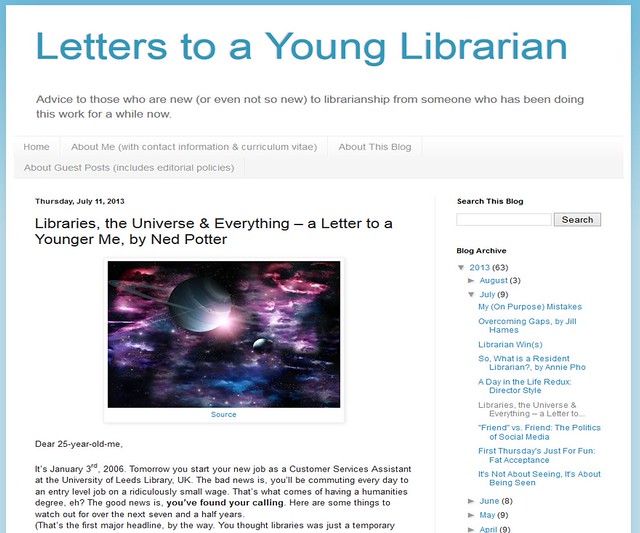
Recently I've read a good few posts about work / life balance. I also get asked about it sometimes.
This post has turned out quite long, so here's a one sentence version for those whose work / life balance doesn't give them enough time to read the whole thing... The balance changes over time, which is fine, and so is having bursts of intense work activity balanced out by longer periods of 'life', but you need to keep a hold of what you're doing this for and where it's taking you.
Anyway, for what it's worth, here's what I think:
1) Whatever the balance is like now, it needs to be FOR something. If you feel that you're working too hard, it had better be because this is helping you achieve something - in other words, it has to be a means to an end not an end in itself. Personally I like to be either happy with the balance (with 'life' very much in the ascendancy) or comfortable in the knowledge that if the balance is wrong, it's getting me somewhere I specifically want to go, after which I can relax again.
2) Work / life balance isn't static over time. I wonder if people look at everyone else and just assume their balance is a permanent one? As in, person X is at SO many events, they must be 'always on', or person Y really seems to spend a lot of time with their family, how do they do it? But presumably we're just seeing a snapshot of a particular time. Good work / life balance is fluid.
In my view, it should be as in favour of 'work' as it will ever be, at the start of your career. The period on which an info pro is defined as a 'new professional' is often said to be the first 5 years, and that's a nice marker. You do a LOT of work in those five years, in order to expand your horizons, add to your CV, find out what you really like, and get noticed, get into the kind of job you want. Then after that, the balance can shift much more towards 'life' because you've put in the hard work to build some kind of platform, and then you're on the platform.
If you're a new professional reading this (see this, also; it might be useful) and you're thinking 'all the papers I'm writing and conferences I'm helping to organise, and presentations I'm giving - this isn't sustainable' then that's probably fine - it doesn't have to be sustainable. Just make sure at some point you do actually cut down or stop. Which leads me to...
3) Sometimes it's okay temporarily putting the balance out if it's going to be worth it in the long term. So sometimes, you can take on a really big project that you know will make things difficult, as long as you know when the end of the project is and that things will become a lot easier as a result. The key things here are taking things on which actually have an end! And not just chain-smoking right onto the next big thing when they do end. It's fine to stop. I know people (you know who you are!) who simply don't stop, even though they know they should... (This is, as you can imagine, a self-perpetuating cycle. Librarian Z takes on lots of things, so a: becomes expert in a lot of fields and b: gets a reputation as being helpful and receptive to being asked to do stuff, and so gets asked to do ever more stuff, etc etc, forever.)
4) Saying no is excellent. In my experience it feels good to say no when it's the right thing to do. Obviously it's better for the person asking if you can recommend someone alternative to do whatever it is instead. But the key thing is, once you've got yourself into a position where you're asked to do things, saying no doesn't mean you get asked any less in future. (Sometimes people feel like they ought to grab every opportunity, even not overly suitable ones, in case eschewing results in the opportunities drying up. But this isn't the case in most people's' experience.)
5) There are two types of balance - short-term and long-term. The day-to-day stuff is the detail level - doing that talk or not doing it, getting a sponsored place at that event which involves writing a report afterwards, or not. That can be managed, and can be fluid.
But then there's the long-term which is basically your job, which is a little harder to be in control of after a certain point. Some types of job really DEMAND an enormous amount of work hours. This post from the always honest and readable Jenica Rogers literally made me not want to be successful. So you have to think about where you're going, about what all your hard work is ultimately for.
I used to do a LOT more stuff in my own time (see 1, 2 and 3 above) because it would help me get a job where the same stuff was relevant to my work, so I wouldn't have to do it in my own time anymore. I'd use annual leave to speak at a conference. I wouldn't do that now - I did it then because it was a short-term thing and it was worth it.
The job it all resulted in is not the kind of job where you have to work 50 hour weeks, and nor would I want one of those (even for twice the salary). Also, I have to work where I live, because my work / life balance approach is that you live where you want to and then find work there - as opposed to going where the work is. So if someone says 'I'll give you £150k a year to do your ideal job in London' I say no without hesitation. That's the long-term balance.
6) You don't have to the best that you can be. I've said this before and I'll keep saying it to anyone who'll listen. If being 80% (or whatever) of who you could be makes you HAPPY, that's what you should be aiming for. Society is blindly accepting of the notion that doing one's best is the be all and end all, but it's only worth it if that'll make you happy!
7) Focus on things you're naturally good at so you can make more progress in a shorter time. You can make more time for life if the work comes easy to you, so as much as it's nourishing to challenge yourself, don't take that idea so far that you always have to work doubly hard on everything because everything you take on is out of your comfort zone.
***
Everyone is different, but the above is what works for me. I'm really happy with the balance I have, I'd recommend it - but to people who are a bit like me, not to everyone... A lot of people have a lot more drive than I do, and this approach probably wouldn't suit them and their own quest for happiness and contentment.
When I wrote the book, the balance was wrong. I was working on weekends, I had a young child, and it felt awful. I felt like I'd done the wrong thing. In fact, I probably HAD done the wrong thing - I certainly wouldn't recommend it. (Again, that's just me - Beth did much the same thing at much the same time and coped a lot better than I did.) But I can't regret it now because we got through it and I am where I want to be, doing freelance work for the BL among others, as well as the job I love. I do freelance training about areas I already know about and have a natural affinity for, so I don't have to spend much of my free time preparing them. I obey number 7, above - if someone came to me and said 'could you run a workshop for us, on managing change' I'd say no, call Lisa Jeskins. It would take me too long to put together the materials to keep my work / life balance as I'd want it be (but Lisa's done such a course before, and in any case is a full-time trainer). I obey number 4 too - of all the interesting offers I had in 2012 to do stuff at conferences, I didn't do 13 of them, even though I really wanted to. People often say 'it's the things you don't do that you regret' and I understand that, but actually I don't regret saying no to anything, even if, at the time, it was really hard to do.
I am a very reflective person; I spend lots of time analysing stuff, processing stuff. So I am very aware of what works for me and what doesn't, which is how I've arrived at the above, which is basically a description of my life as much as it is advice to anyone else. I think the key thing is to do your own analysis of where you are, what you're doing, and where you're going, as objectively as possible, without reference to your peers or accepted norms. It's easy to be influenced by what librarian X is doing, or to feel we 'should' be more like Y. But actually that's not relevant, it's all about you and only you.
What is going to make you happy?
P.S [added the next day]: I meant to say, all the extra stuff we take on should be so fun it doesn't feel like work anyway. (This partly why it's easy to get overwhelmed by it and out of balance, because it's enjoyable.) If you're taking things on which feel like work, or things which were previously fun start to feel like work, that's a sign that it's time to cut down - either getting rid of some long-standing responsibilities, or saying 'no' for a long period of time, or both.
The message is (and this post is aimed primarily at information professionals - this may not be true in other industries, I don't know) - there should be enough relevant and interesting opportunities out there for you never to have to feel like all this stuff is a drag. Seek out the good stuff. :)




